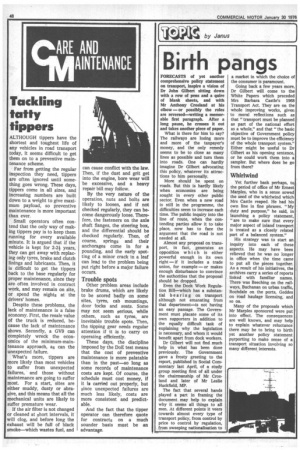Tackling tatty tippers
Page 54

If you've noticed an error in this article please click here to report it so we can fix it.
ALTHOUGH tippers have the shortest and toughest life of any vehicles in road transport today, it seems difficult to get them on to a preventive maintenance scheme.
Far from getting the regular inspection they need, tippers are often ignored until something goes wrong. These days, tippers come in all sizes, and increasing numbers are built down to a weight to give maximum payload, so preventive maintenance is more important than ever.
Small operators often contend that the only way of making tippers pay is to keep them running for every available minute. It is argued that if the vehicle is kept for 2-21 years, they can get away with replacing only tyres, brake and clutch linings and lubricants. Then, it is difficult to get the tippers back to the base regularly for proper maintenance, since they are often involved in contract work, and may remain on site, or spend the nights at the drivers' homes.
Despite these problems, the lack of maintenance is a false economy. First, the resale value of the truck is reduced, because the lack of maintenance shows. Secondly, a GV9 can completely wreck the economics of the minimum-maintenance approach, as can the unexpected failure.
What's more, tippers are more likely than most vehicles to suffer from unexpected failures, and those without maintenance are going to suffer most. For a start, sites are either muddy, dusty or abrasive, and this means that all the mechanical units are likely to suffer premature wear.
If the air filter is not changed or cleaned at short intervals, it will clog, and before long the exhaust will be full of black smoke—which wastes fuel, and can cause conflict with the law. Then, if the dust and grit get into the engine, bore wear will be excessive, and a heavy repair bill may follow.
By the very nature of the operation, nuts and bolts are likely to loosen, and if not checked regularly, they can become dangerously loose. Therefore, the fasteners on the axle shaft flanges, the steering box, and the differential should be checked regularly. Then, of course, springs and their anchorages come in for a pounding, and the early spatting of a minor crack in a leaf can lead to the problem being put right before a major failure occurs.
Trouble spots
Other problem areas include brake drums, which are likely to be scored badly on some sites, tyres, cab mountings, door locks and seats. Some may not seem serious, while others, such as tyres, are inevitable trouble spots. Then, the tipping gear needs regular attention if it is to carry on operating efficiently.
These days, the discipline imposed by the DoE test means that the cost of preventive maintenance is more palatable than in the past—so long as some records of maintenance costs are kept. Of course, the schedule must cost money, if it is carried out properly, but since unexpected failures are much less likely, costs are more consistent and predictable.
And the fact that the tipper operator can therefore quote for contracts on a much sounder basis must be an advantage.
































































































